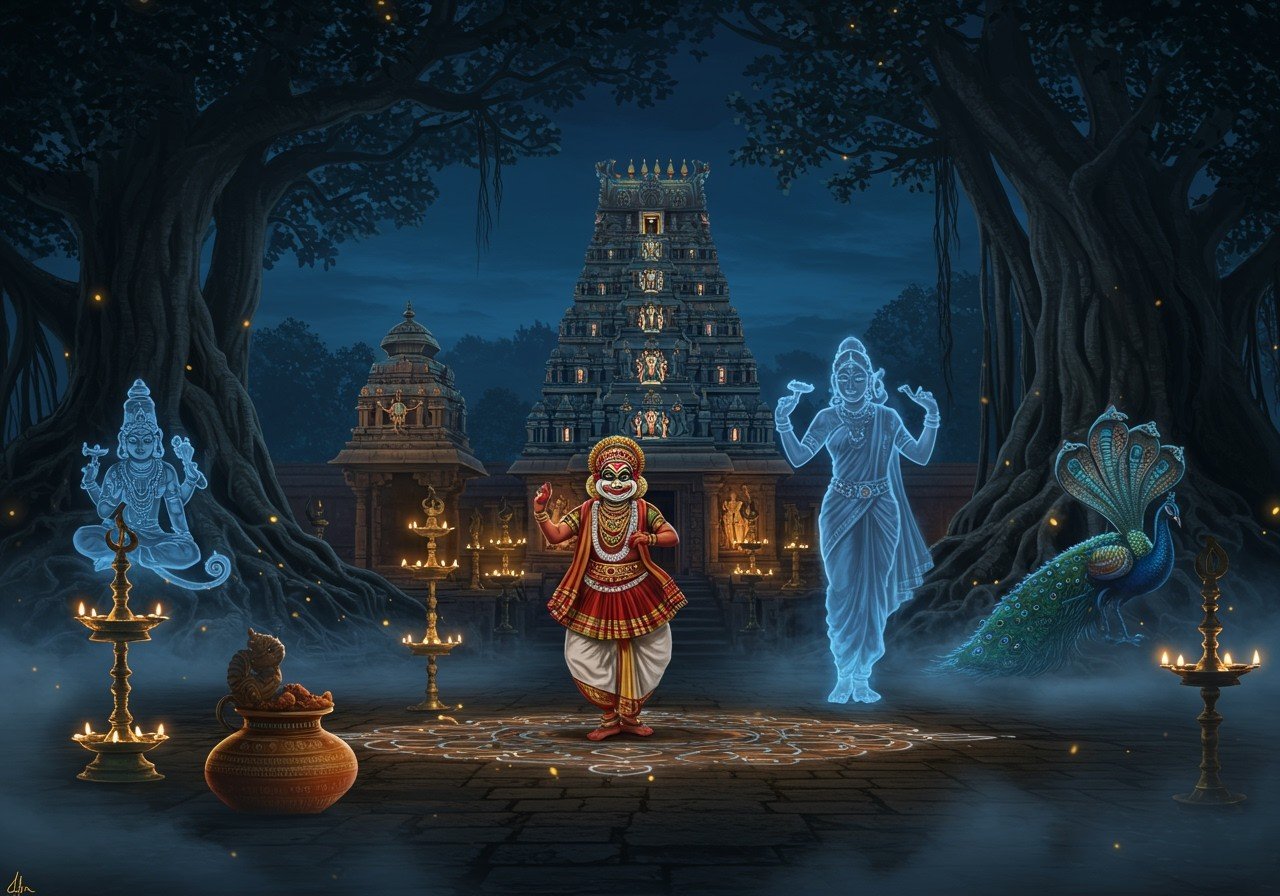
South Indian mythology is a captivating blend of ancient tales, vibrant traditions, and divine beings, deeply rooted in the Dravidian culture and intertwined with the broader Hindu pantheon. This rich tapestry of folklore offers a unique perspective on spirituality, morality, and the interplay between humans and the divine.
The Divine Beings of South India
The pantheon of South Indian mythology is diverse, encompassing both village deities and mainstream Hindu gods. These deities play integral roles in the lives and beliefs of the people.
Guardians of the Village: Grama Devatas
-
Village Deities (Grama Devatas): Primarily goddesses, these powerful spirits are intrinsically linked to the well-being of villages, offering protection, fertility, and prosperity. These deities can be both benevolent protectors and fierce avengers, depending on the circumstances and their devotees’ actions.
-
Mariamman: A revered goddess across South India, Mariamman is associated with fertility, motherhood, and protection against diseases like smallpox. She is especially prominent in Tamil Nadu, where she is considered a principal mother goddess. People seek her blessings for good health and prosperity.
-
Ayyanar/Sasta: Often depicted riding a horse and wielding a sword, Ayyanar is the guardian deity of villages, ensuring their safety and protecting them from harm. In Tamil Nadu, he is known as Ayyanar, while in Telugu regions, he is called Poturaju. He is often worshipped at the village borders to ward off evil spirits.
-
Other Goddesses: Pochamma, popular in Telugu regions, and Yellamma, worshipped in northern Karnataka and western Telangana, are also prominent village deities. Each goddess has unique attributes and legends associated with them, adding to the rich diversity of South Indian mythology.
Mainstream Hindu Deities in South India
-
Murugan: The god of war, victory, and love, Murugan is widely worshipped in South India, Sri Lanka, Singapore, and Malaysia. Known by various names like Kandhan, Kumaran, Kartikeya, and Subramaniyan, he is a powerful and beloved deity. He is often depicted as a youthful warrior riding a peacock.
-
Ayyappan: A unique deity predominantly worshipped in Kerala, Ayyappan is considered an incarnation of Dharma Sasta, the offspring of Shiva and Vishnu. He embodies dharma and righteousness and is revered by devotees who undertake a pilgrimage to his shrine in Sabarimala.
Legends and Stories: Whispers of the Past
South Indian mythology is filled with captivating legends and stories that have been passed down through generations. These narratives often carry moral lessons and provide insights into the cultural values of the region.
-
Kaveri River: The Kaveri River, a lifeline for millions, is revered as a goddess. The legend tells of a rock’s intense tapas (penance) to transform into the river, bringing life and sustenance to the arid land. This story symbolizes perseverance and the power of transformation.
-
Seven Pagodas of Mahabalipuram: A popular legend claims that the seven pagodas of Mahabalipuram were so magnificent that they aroused the jealousy of the gods. A devastating storm was sent, submerging all but one temple, a testament to the ephemeral nature of beauty and the power of divine wrath.
-
Chandra’s Curse (Chondrera Obhishaap): The Moon God, Chandra, was cursed by the sage Durvasa to wane and lose his brilliance. This myth explains the cyclical phases of the moon and serves as a reminder of the cyclical nature of time and the impermanence of all things.
Dispelling Myths About South India
Beyond the captivating mythology, it’s crucial to address some common misconceptions about South India. The region’s diversity extends beyond the stereotypes often portrayed.
-
Culinary Delights: South Indian cuisine is far more diverse than just idli and dosa. It boasts a rich variety of flavors, spices, and ingredients, reflecting the unique culinary traditions of each state.
Discover authentic South Indian spices and ingredients at poojn.in to recreate these diverse dishes at home.
-
Linguistic Diversity: While knowing a South Indian language enhances the experience, it is not impossible to live in South India without one. English is widely spoken, and the warmth of the people transcends language barriers.
Immerse yourself in the spiritual traditions of South India with our collection of Sanskrit mantras and chants, available at poojn.in.
-
A History of Resilience: Contrary to the myth of a perpetually protected land, South Indian empires like the Chalukyas, Rashtrakutas, Hoysalas, and Vijayanagara fiercely defended their territories against invaders. Their history is a testament to their strength, resilience, and strategic prowess.
Explore our collection of books and resources on South Indian history and culture at poojn.in to delve deeper into this fascinating subject.
South Indian mythology is a captivating journey into a world of ancient beliefs, powerful deities, and timeless stories. By understanding these narratives, we gain a deeper appreciation for the rich cultural heritage of South India and its enduring influence on the lives of millions.
Explore the rich traditions of South India with authentic pooja items from poojn.in. We offer a wide selection of products, from traditional brass lamps to sacred threads, to enhance your spiritual practices.


